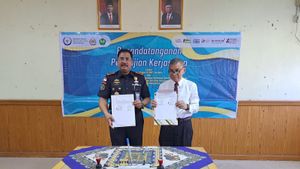JAKARTA - A number of universities are closed by the Ministry of Education, Culture, Research and Technology (Kemendikbudristek). The government needs to provide certainty for these college students and lecturers.
"Do not let abandoned students and lecturers be unemployed because they do not find a new place to continue their education and work. This must be done for the quality of education in Indonesia," said Chairman of the Indonesian House of Representatives, Puan Maharani, Tuesday, May 30.
Based on Kemenbudristek records as of May 25, there were 23 universities whose operational permits were revoked. The revocation of the permit is a follow-up to 52 public complaints. Meanwhile, in 2022, there will be 31 universities whose permits are frozen.
Several things are the reasons for the closure of dozens of universities. Starting from not meeting the provisions of higher education standards, carrying out fictitious learning, practicing buying and selling diplomas, irregularities in the provision of scholarships for Smart Indonesian Card Lectures (KIP-K), and disputes between the organizing bodies so that learning is not conducive.
Apart from the existing problems, Puan reminded the Government to have other alternative programs for students and lecturers whose universities are closed.
"The government must prepare a student transfer scheme to other universities by taking into account many aspects. For lecturers, the Government must also facilitate new workplaces," said the former Coordinating Minister for Human Development and Culture.
اقرأ أيضا:
"The closure of universities should not hinder the learning process, and affect the welfare of educators," continued Puan.
The first woman to serve as Chair of the Indonesian House of Representatives also reminded the Government to pay attention to the availability of universities or universities that are able to accommodate all students. Puan said the government must ensure that transfer assistance to other universities can be carried out as long as there is authentic learning evidence.
"So that students who really learn can complete education to get the educational degree they aspire to," he said.
Puan realized that the Government's efforts to fight for the quality of education and graduates in Indonesia were not easy and needed accuracy. Therefore, cooperation from all parties is needed to support the achievement of the granting of educational rights for all Indonesian people as mandated by the constitution.
"Collaboration between all stakeholders is needed in anticipating the closure of universities. Don't let the negative aspect remain, without a solution," said Puan.
On the other hand, Puan said that improving the quality of education has become the main focus in efforts to improve the quality of human resources. This, said Puan, cannot be separated from the state's efforts to create a better future for future generations.
"Through progressive and collaborative steps, efforts to improve the quality of education have had a significant positive impact in recent years," he said.
Even so, Puan emphasized that the Government must also improve the construction of educational facilities. Including in remote and remote areas that previously had limited access.
"This allows children from various backgrounds to gain access to proper education, and minimize existing educational gaps," explained Puan.
Furthermore, the DPR hopes that the Government will continue to improve the improvement of the learning process in universities. According to Puan, this is an important part of improving the quality of education.
The increase in the curriculum is also an integral part of efforts to improve the quality of education. A holistic and active learning-oriented curriculum provides students with the opportunity to develop their potential as a whole," said the 2-year Honoris Causa Doctorate.
Puan believes that improving the quality of education in Indonesia can give birth to a young generation who is skilled, creative, and has broad insights. So that Indonesian human resources are able to compete globally and contribute positively to the development of the country.
It is hoped that improving the quality of education in Indonesia can provide a better future for children and future generations. They will become a pillar of strong development, highly competitive, and able to innovate in the face of dynamic changes in the globalization era," concluded Puan.
The English, Chinese, Japanese, Arabic, and French versions are automatically generated by the AI. So there may still be inaccuracies in translating, please always see Indonesian as our main language. (system supported by DigitalSiber.id)

















